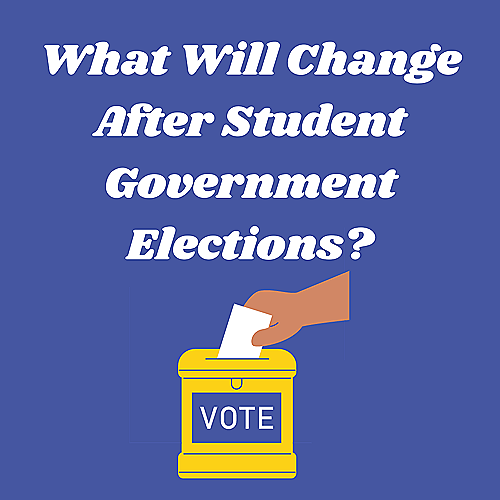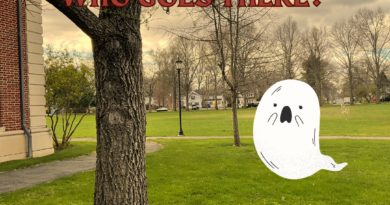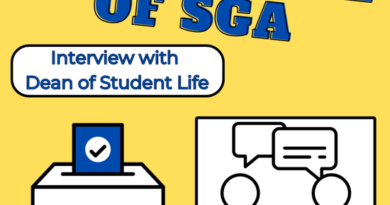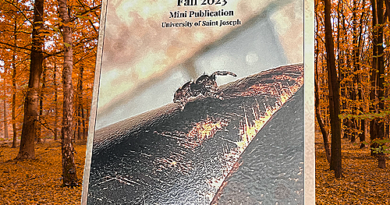What Will Change After Student Government Elections?
Written by Crista Fiala
At 12:36 pm on Wednesday, November 29, Dean of Student Affairs Brandon Dawson sent an email announcing the upcoming election schedule for student government positions. Nominations will be due December 6 and elections will take place online between December 11 and 13. After a semester of delay, the Student Government Association (SGA) seems to be returning as an active organization on campus. Many students missed having the opportunity to voice their concerns through SGA’s platform this semester. Katelynn Nguyen (Class of 2025) wrote in response to October’s SGA article, “In my opinion, the lack of a Student Government Association (SGA) on campus is an issue. Without an SGA, there is little to no voice for students on campus, meaning that students will feel as if they are unheard when complications arise.” The survey the USJ News Nest ran with the previous article shows that 47 out of the 50 undergraduate students who responded wanted a student voice to represent the concerns of their class. Seven were interested in becoming members of SGA.
Some students were discontented with the silence and lack of updates this semester. Kiyah Pelletier (Class of 2023) wrote in her survey, “There has been no news this year and no update. Even if the update was ‘we have no update,’ it would be better than crickets.” Gia Alvarez (Class of 2026) responded to the October article, “As a sophomore living on campus, I have found that the lack of an SGA is unfortunate for our campus as a whole. The sad part is that I never knew that the SGA was not running this semester until I read this article because I have not seen it advertised.” 10 out of 50 undergraduates who responded to the survey reported that they were not even aware that USJ had a student government.
Updates the USJ News Nest Received from President Free and Dean Dawson
The USJ News Nest reached out to Dean Dawson and President Rhona Free about SGA election updates on November 28. We received responses a few hours before elections were announced on November 29. President Free explained, “My understanding is that there have been complications related to SGA by-laws but that those are being resolved and elections will be held as soon as possible. Dean Dawson and at least one student who was an SGA officer last year have spent a lot of time on getting the elections completed in order to have a fully functioning SGA again. We all share an interest in achieving that goal. While the Dean has held open forums where students can provide input and suggestions and express concerns, those are not intended to replace SGA.” President Free’s statement that there have been some complications with the bylaws might relate to how former President Alex Amoro was unable to update the constitution and bylaws before he graduated. The election email asks current students to review the bylaws, which are still from 2020. It is not clear why these complications would have caused a delay when SGA needs to be a fully functioning organization with members to update the bylaws.
Dean Dawson responded to the USJ News Nest, “I am finalizing communications with Syed [sic] Ali. Information about nominations and elections will be forthcoming. Thank you for pushing the issue and following up on next steps.” Syed Ali was last year’s active vice president. While former President Amoro graduated at the end of the 2022-2023 school year, last year’s Secretary Nadia Krill and Treasurer Jordyn Hunt still actively attend USJ. It is not clear why Ali and Dean Dawson worked to prepare for elections without Krill or Hunt. The USJ News Nest greatly appreciates President Free and Dean Dawson’s responses and their dedication to reviving SGA.
Current Club, Participation, and Representation Issues
With the return of SGA next semester, the question remains as to what extent these issues with clubs, participation, and representation on campus will be improved. It is important to acknowledge, however, that issues with clubs and participation have been ubiquitously reported by many colleges all over the United States. Erin Gretzinger and Maggie Hicks recently published a Chronicle of Higher Education article on November 13, 2023, titled, “Reviving Campus Life: Student Clubs Collapsed Under the Weight of Covid. Here’s How a College is Trying to Rebuild Them.” Gretzinger and Hicks relay how twelve different administrations reported to the Chronicle that clubs have been slow to recover from the lack of student participation since students have grown used to the “common Covid-era mantra: Go to class, eat, go home.” The article also explains that returning students have missed out on the mentorship of older students and did not inherit the knowledge of how to run a club or “apply for funding, reserve spaces for rooms, or print fliers.” The Covid shutdown has undoubtedly had an impact on student participation and club presence on USJ’s campus. However, there seem to be some USJ-specific issues that have exacerbated these problems.
Many students this semester had a hard time running their clubs without the support of SGA. Katelynn Nguyen wrote, “Conclusively, the lack of an SGA personally impacts me due to my involvement in the Pre-Pharmacy club. Our club has recently re-implemented itself, but we currently struggle to hold events due to little funding and student involvement. As much as we try to advertise the club to other pre-pharmacy students or other students who solely want to join out of curiosity, we have found it difficult to reach larger audiences of students, especially with our E-Board members’ busy schedules.” In an interview with the President of the Asian Student Union (ASU), Alfred Valero (Class of 2024) shared with the USJ News Nest, “If some clubs also had issues [in the past], SGA would do its best to provide help to the club, whether it would be in the form of funding or support through promotion. I strongly believe the lack of SGA presence has been detrimental for many clubs as that was their main source of promotion and guidance. It also has made the representative role for clubs rendered useless as well, as representatives were meant to promote their clubs at SGA meetings.”
To some extent, the marketing department has been able to help keep some of these clubs afloat. Nguyen stated, “If not for the USJ social media accounts that help to advertise events on campus, many club-run activities on campus would be unknown, thus decreasing and showing a lack of student campus life.” On the other hand, she also pointed out how there is still a “lack of event advertising [that] especially doesn’t help campus life since there is a large commuter population.” Valero expressed similar mixed sentiments about marketing as he explained that ASU has had its “ups and downs with marketing. They helped us create and design a logo for our club, which I really appreciate. However, when it came to poster making, it was a bit of a frustration. There were a couple of times when we thought our advertising poster looked fine, and it had to be sent back to marketing for revisions. Oftentimes, there would be multiple revisions done back and forth for just one flyer.” When asked about his thoughts on the USJ website, he shared, “I have heard complaints about it. One of the main concerns that I have is their club page. They advertise a lot of clubs that do not exist anymore at the university. A suggestion that I would like to see is that they revamp that page and also add contacts for those running the clubs.” Nguyen and Valero illuminate how marketing has been a great help for many clubs this semester and in the past, but the department may have been causing some difficulties for clubs long before this year.
Valero also expanded upon the important role clubs have of representing students of different backgrounds on campus: “The clubs at USJ are very special to me because they allow people to be connected to each other. USJ is a very small campus with a tight-knit community. It’s always really awesome to see an event put on by someone that I know represents them.” Beyond this last semester, however, the university might not have always done enough to strive for equity and representation for certain people, even when SGA still had all four of its main members.
Last year’s Senator Hannah Fitzgerald (Class of 2024) reached out directly to the USJ Nest Nest to express that “The lack of feminine waste baskets in McGovern brings up multiple concerns for hygiene and privacy. When individuals are on their period or are using feminine hygiene products, there is nowhere to dispose of it properly and discretely.” She shared how she “mentioned [the issue] to Dean Dawson probably a year ago at one of those ‘talk with Dean Dawson nights,’ and he said he would look into it. Then, I sent an email to him later on requesting it. I felt like he wasn’t going to do anything about it, so I emailed Rayna Dyton-White expressing concerns, and she forwarded it to the office of finance or something, and she told me how it needed to be approved by them.” Fitzgerald, however, has still not seen the issue of a lack of feminine waste baskets addressed in McGovern. This situation could indicate a lack of an institutional system to deal with certain issues that students bring up. It could also indicate, however, that students – even members of SGA – have not been given institutional knowledge about how or to whom they should bring their concerns.
During this election season, the USJ News Nest urges undergraduates to vote and nominate themselves if they are interested in being a part of SGA. We are looking forward to seeing what kind of change elections and the return of SGA will bring next semester. The USJ News Nest will keep you updated on SGA’s developments.
The entirety of the USJ News Nest’s interview with Alfred Valero can be found below:
What problems do you think were caused by the absence of SGA this semester? What issues might have been ongoing before this semester?
“I think the lack of SGA presence this semester was a huge problem not only for ASU but also clubs in general. SGA was a great resource and helping hand for many clubs at USJ. For example, SGA and Jay Henderson at the time were huge components for the behind-the-scenes work to help ASU officially become a club. While it was a lengthy process, they were very thorough with their details, and SGA was very supportive of our club. Seeing it firsthand, I believe one of the main issues that clubs suffer from is attendance and interest. SGA was perfect in that regard because SGA meetings were used as an opportunity to promote your club and, at the same time, learn what other clubs were as well. In a way, it was kind of like a huge networking event. If some clubs also had issues, SGA would do its best to provide help to the club, whether it would be in the form of funding or support through promotion. I strongly believe the lack of SGA presence has been detrimental for many clubs as that was their main source of promotion and guidance. It also has made the representative role for clubs rendered useless as well, as representatives were meant to promote their clubs at SGA meetings. Not only that, but I have seen that starting a club has become extremely difficult for some people with the absence of SGA. There were talks of people interested in starting a club at USJ but had no idea where to begin. As I have mentioned, SGA had a huge impact for the formation of ASU. We were very fortunate to have an advisor like Megan Vo who came out and supported us fully throughout the absence of SGA. She will be greatly missed not only for ASU but the USJ community. We wish her the best of luck in her new journey!”
How has marketing been a help or a hindrance to your club? Have you heard any complaints about the USJ website?
“We have had our ups and downs with marketing. They helped us create and design a logo for our club, which I really appreciate. However, when it came to poster making, it was a bit of a frustration. There were a couple of times when we thought our advertising poster looked fine, and it had to be sent back to marketing for revisions. Oftentimes, there would be multiple revisions done back and forth for just one flyer. While I understand that they can be busy with other clubs, there were a couple of times when we wanted to send out a flyer on campus a couple days in advance, but marketing had trouble with our posters. We ended up having our flyers last minute. As for the USJ website, I have heard complaints about it. One of the main concerns that I have is their club page. They advertise a lot of clubs that do not exist anymore at the University. A suggestion that I would like to see is that they revamp that page and also add contacts for those running the clubs.”
Do you think clubs play a special role in representing people from different backgrounds, races, etc.?
“Yes, 100%. The clubs at USJ are very special to me because it allows people to be connected to each other. USJ is a very small campus with a tight-knit community. It’s always really awesome to see an event put on by someone that I know represents them. Not only that, but clubs also build community which can lead to a larger impact not just at USJ. It brings people together. I always tell all my FYS freshmen that USJ is what you make of it. I tell them to join clubs and put themselves out there because I think everyone should be involved in something. If there isn’t a club for them, they can start one. USJ clubs are definitely special to me because they helped give me a positive USJ experience.”
Thank you to all the members of the USJ News Nest who helped to create and spread the survey around campus. Thank you to the undergraduates who responded to the October article or survey, and a special thanks to those who gave us their permission to feature their responses in this article.
Featured Image: Crista Fiala




